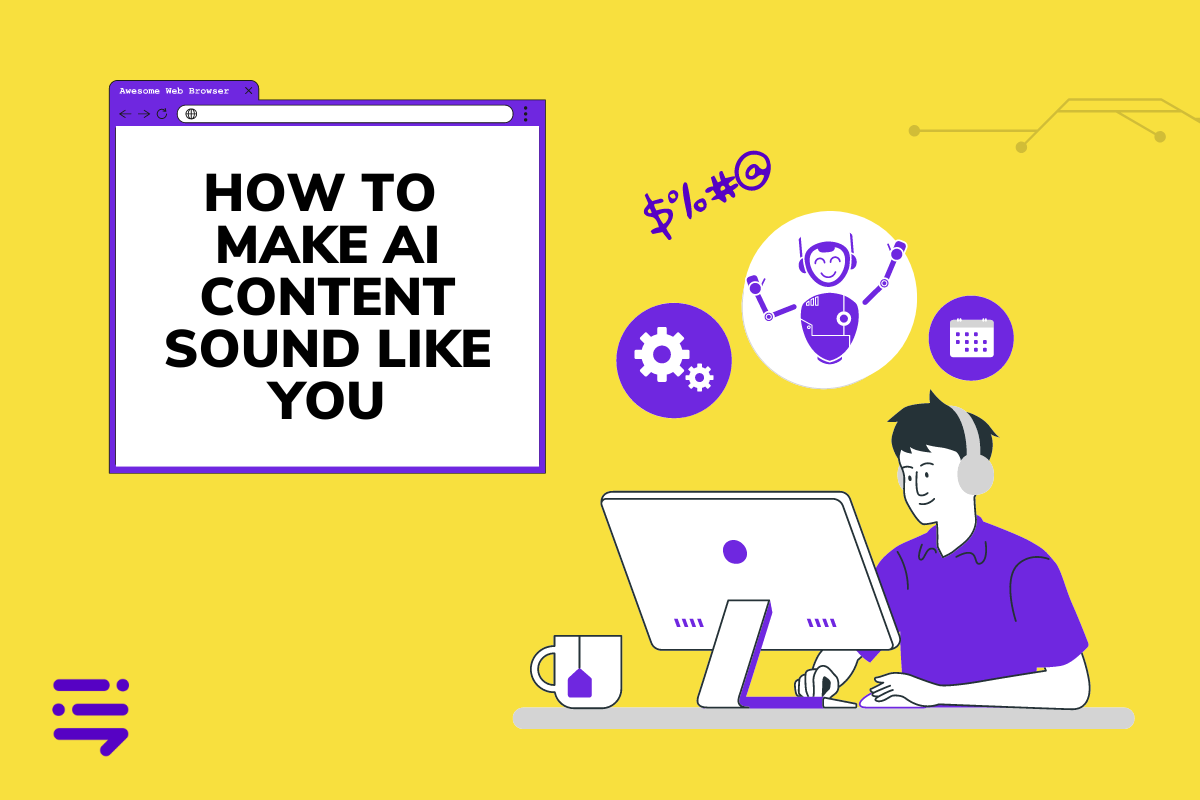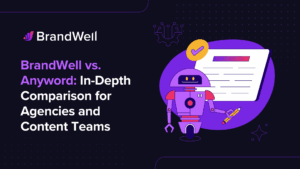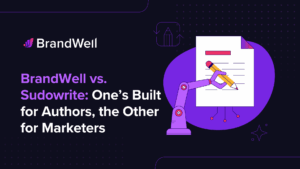The secret of getting ahead is getting started.
As we leap into the AI era, this Mark Twain quote rings especially true for writers and editors. Our tools have changed – from typewriters to text editors, and now to AI-driven writing assistants. These advanced platforms are reshaping how we create and publish content.
The AI revolution has opened up a whole new field: AI content optimization. Here we’ll dive deep into what it means to humanize AI-generated content.
We’ll also explore emerging job roles and skills that keep pace with technology’s march forward.
The impact on professional writers isn’t all about competition; it’s also about collaboration. Learn how these smart tools can become partners in creativity rather than rivals for jobs.
The Evolution of Writing in the AI Era
In the beginning, there were pens. Then came the typewriter, bringing with it a surge in written communication speed and legibility.
The computer followed suit, revolutionizing editing by letting us delete without correction fluid or start over without crumpling paper.
Now, AI writing tools have arrived on the scene, offering not just corrections but entire paragraphs crafted at the click of a button.
A significant chunk of companies are now harnessing these AI powerhouses for their content needs — and this trend is only going up.
This shift means less time brainstorming, outlining, and drafting articles because algorithms can generate them rapidly — often with surprisingly human flair.

The Impact of AI on Professional Writers and Editors
Artificial intelligence is shaking up the world of content, bringing new dynamics to the roles of writers and editors.
Today’s writing landscape has us partnering with AI more than ever. Surveys reflect mixed feelings among writers — some see a tool that boosts efficiency while others fear it may steal their jobs.
But one thing is clear: embracing AI can enhance our work, not replace it.
We’re learning to lean into this change, guiding these intelligent systems to align with our creative visions. By merging human creativity with machine precision, we’re opening doors to optimized content at speeds previously unimagined.
This partnership isn’t just about cranking out articles — it’s about refining ideas in ways that only a team of diverse thinkers can achieve.
As professional writers adapt, they find themselves shaping narratives alongside algorithms designed for peak performance in search engine rankings — a true melding of art and science.

Challenges and Ethical Considerations in AI-Generated Writing
The pen is mightier than the sword, but what happens when the pen’s a robot?
In the world of content creation, artificial intelligence has been both a boon and a bane.
Maintaining Originality and Authenticity
To stay original with AI, we need smart strategies.
AI can churn out words faster than caffeine-fueled copywriters on deadline day. But here’s the kicker: without human creativity, it risks sounding like every other robot out there.
We’re not just after volume; we want a real voice — a brand’s unique spin on things that no algorithm can fully capture yet.
Here are some tips on how to make AI content sound like you:
- Research what your audience values, their interests, and how they communicate, and adjust the tone and style of the content to match their expectations (e.g., formal, casual, humorous).
- Use simple language and avoid jargon.
- Write as if you are speaking directly to the reader. Use contractions (e.g., “you’re” instead of “you are”) to make the content feel more natural.
- Address the reader directly by using second-person pronouns like “you” to create a direct connection.
- Include scenarios or examples that the audience can relate to.
- Recognize the emotions and concerns of your audience. Use empathetic language to show understanding.
- Maintain a positive and encouraging tone, even when discussing challenges or problems.
- Use storytelling techniques to make the content more engaging. Share anecdotes or hypothetical situations.
- Introduce characters and dialogue to make the content lively and relatable.
- Include images, infographics, and videos to break up text and make the content more visually appealing.
- Use interactive elements like quizzes, polls, or interactive infographics to engage the audience.
- Include user reviews, testimonials, or case studies to add credibility and human perspective.
- Avoid over-automation and maintain a level of transparency about the use of AI in content creation.
- Have human editors review and refine AI-generated content to add a personal touch and ensure it aligns with human communication norms.
- Thoroughly proofread to eliminate any awkward phrasing or errors that can disrupt the reader’s experience.
- Include clear calls to action that encourage readers to engage with the content, such as commenting, sharing, or providing feedback.
- Foster a sense of community by engaging with readers’ comments and feedback, making them feel valued and heard.
By incorporating these tips, you can create AI-generated content that feels more human, relatable, and engaging to your audience.
Navigating Copyright and Ownership
Copyright law didn’t see AI coming — it was busy looking at humans — so now we’re in murky waters. It makes you wonder who truly owns those auto-generated phrases.
You’d think twice before grabbing someone else’s work off their desk; why should digital be any different?
We’ve got to get clear about this because people are already noticing overlaps that look way too familiar for comfort.

The Future of Writing with Artificial Intelligence
Imagine a world where your favorite books are written by a robot that never sleeps.
Artificial intelligence is reshaping the writing landscape, and experts predict AI’s capabilities in this field will skyrocket.
Advancements in Natural Language Generation (NLG)
We’re seeing NLG technology grow smarter every day. Soon, it could craft stories indistinguishable from those written by humans.
This tech is learning to pick up on nuances like sarcasm and humor — truly capturing human expression.
Potential New Genres of AI-Driven Literature
New genres might emerge as AI blends coding with creativity. We could witness literature that adapts to our moods or even changes based on reader feedback in real time.
With such advancements, the storytelling possibilities are boundless, leading us into uncharted literary territories shaped by algorithms yet fueled by human desires and interactions.
Tools and Platforms for AI Writing
Writers today have a powerful ally in artificial intelligence, which has become an indispensable part of the content creation toolkit.
A staggering number of professionals are now using AI writing tools to streamline their workflows and enhance productivity.
The trick is finding the right software that fits your unique needs as a writer or editor.
Comparing Top AI Writing Assistants
Different platforms shine for various tasks — some excel with snappy short copy like ChatGPT while long-form specialists like BrandWell are wizards at blog articles. It’s all about accuracy, features, and how seamless they make your experience.
You’ll want something intuitive yet robust enough to handle nuances in language without breaking a sweat — or making you break yours.
Integrating AI Tools into Writing Workflows
Incorporating these digital assistants should feel like bringing on a new team member; one who’s always ready to help churn out ideas or polish sentences at lightning speed.
Beyond just spell-checks, these platforms can suggest tone adjustments and provide stylistic insights — all designed to let writers focus more on creativity than correctness. So pick wisely because they’re here not just as helpers but partners in crafting compelling content.
Conclusion
Wrap your head around this: artificial intelligence optimization is a game changer. It’s turning the writing world upside down, making content creation faster and more efficient.
Remember these bits: AI isn’t replacing writers; it’s giving them superpowers. Jobs are evolving, with new roles like AI content optimization coming to the fore.
Dive in, skill up. Know that blending human creativity with machine efficiency is where the magic happens for optimized content.
Tackle those ethical concerns head-on because maintaining authenticity matters just as much now as ever before.
And look forward — AI’s influence on writing is only getting stronger, smarter, and more significant by the day.
Ready to make the shift? Sign up for BrandWell today!




